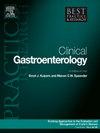对高危人群进行胰腺癌筛查的建议、证据和可持续性
IF 3.2
3区 医学
Q2 GASTROENTEROLOGY & HEPATOLOGY
Best Practice & Research Clinical Gastroenterology
Pub Date : 2025-02-01
DOI:10.1016/j.bpg.2025.101974
引用次数: 0
摘要
胰腺癌是一种高度致命的恶性肿瘤,预计到2030年将成为癌症相关死亡的第二大原因。早期检测可显著改善预后,但由于该病的低患病率和缺乏特异性生物标志物,一般人群筛查仍然是不可行的。本综述评估了目前对高危人群胰腺癌监测的建议,综合了近期研究的证据,并探讨了当前基于成像的监测方案的可持续性。过度诊断、经济可行性和获取方面的差距等挑战突出表明需要有针对性的、具有成本效益的战略。需要合作倡议和联盟来推进生物标志物研究和完善风险分层。通过将循证建议与可持续方法相结合,本综述概述了改善胰腺癌早期发现和降低死亡率的途径。本文章由计算机程序翻译,如有差异,请以英文原文为准。
Recommendations, evidence and sustainability of screening for pancreatic cancer in high-risk individuals
Pancreatic cancer is a highly lethal malignancy and is predicted to become the second leading cause of cancer-related deaths by 2030. Early detection significantly improves outcomes, but general population screening remains infeasible due to the low prevalence of the disease and lack of specific biomarkers. This review evaluates current recommendations for pancreatic cancer surveillance in high-risk individuals, synthesises evidence from recent studies and explores the sustainability of current imaging-based surveillance programmes. Challenges such as overdiagnosis, economic feasibility and disparities in access highlight the need for targeted, cost-effective strategies. Collaborative initiatives and consortia are needed to advance biomarker research and refine risk stratification. By integrating evidence-based recommendations with sustainable approaches, this review outlines pathways to improve early detection and reduce mortality from pancreatic cancer.
求助全文
通过发布文献求助,成功后即可免费获取论文全文。
去求助
来源期刊
CiteScore
5.50
自引率
0.00%
发文量
23
审稿时长
69 days
期刊介绍:
Each topic-based issue of Best Practice & Research Clinical Gastroenterology will provide a comprehensive review of current clinical practice and thinking within the specialty of gastroenterology.

 求助内容:
求助内容: 应助结果提醒方式:
应助结果提醒方式:


